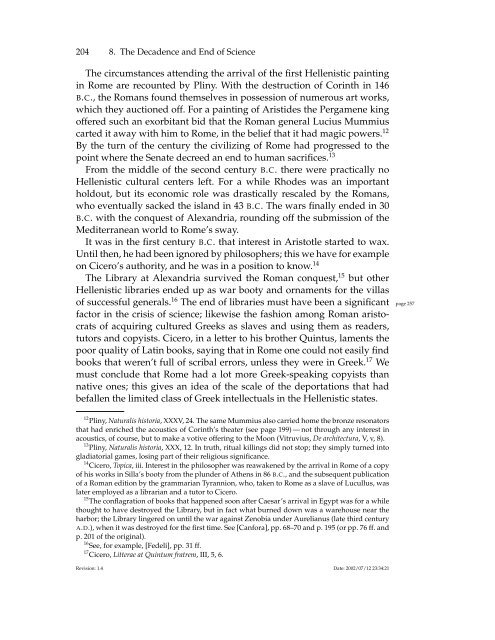1 The Birth of Science - MSRI
1 The Birth of Science - MSRI
1 The Birth of Science - MSRI
Create successful ePaper yourself
Turn your PDF publications into a flip-book with our unique Google optimized e-Paper software.
204 8. <strong>The</strong> Decadence and End <strong>of</strong> <strong>Science</strong><br />
<strong>The</strong> circumstances attending the arrival <strong>of</strong> the first Hellenistic painting<br />
in Rome are recounted by Pliny. With the destruction <strong>of</strong> Corinth in 146<br />
B.C., the Romans found themselves in possession <strong>of</strong> numerous art works,<br />
which they auctioned <strong>of</strong>f. For a painting <strong>of</strong> Aristides the Pergamene king<br />
<strong>of</strong>fered such an exorbitant bid that the Roman general Lucius Mummius<br />
carted it away with him to Rome, in the belief that it had magic powers. 12<br />
By the turn <strong>of</strong> the century the civilizing <strong>of</strong> Rome had progressed to the<br />
point where the Senate decreed an end to human sacrifices. 13<br />
From the middle <strong>of</strong> the second century B.C. there were practically no<br />
Hellenistic cultural centers left. For a while Rhodes was an important<br />
holdout, but its economic role was drastically rescaled by the Romans,<br />
who eventually sacked the island in 43 B.C. <strong>The</strong> wars finally ended in 30<br />
B.C. with the conquest <strong>of</strong> Alexandria, rounding <strong>of</strong>f the submission <strong>of</strong> the<br />
Mediterranean world to Rome’s sway.<br />
It was in the first century B.C. that interest in Aristotle started to wax.<br />
Until then, he had been ignored by philosophers; this we have for example<br />
on Cicero’s authority, and he was in a position to know. 14<br />
<strong>The</strong> Library at Alexandria survived the Roman conquest, 15 but other<br />
Hellenistic libraries ended up as war booty and ornaments for the villas<br />
<strong>of</strong> successful generals. 16 <strong>The</strong> end <strong>of</strong> libraries must have been a significant page 257<br />
factor in the crisis <strong>of</strong> science; likewise the fashion among Roman aristocrats<br />
<strong>of</strong> acquiring cultured Greeks as slaves and using them as readers,<br />
tutors and copyists. Cicero, in a letter to his brother Quintus, laments the<br />
poor quality <strong>of</strong> Latin books, saying that in Rome one could not easily find<br />
books that weren’t full <strong>of</strong> scribal errors, unless they were in Greek. 17 We<br />
must conclude that Rome had a lot more Greek-speaking copyists than<br />
native ones; this gives an idea <strong>of</strong> the scale <strong>of</strong> the deportations that had<br />
befallen the limited class <strong>of</strong> Greek intellectuals in the Hellenistic states.<br />
12 Pliny, Naturalis historia, XXXV, 24. <strong>The</strong> same Mummius also carried home the bronze resonators<br />
that had enriched the acoustics <strong>of</strong> Corinth’s theater (see page 199) — not through any interest in<br />
acoustics, <strong>of</strong> course, but to make a votive <strong>of</strong>fering to the Moon (Vitruvius, De architectura, V, v, 8).<br />
13 Pliny, Naturalis historia, XXX, 12. In truth, ritual killings did not stop; they simply turned into<br />
gladiatorial games, losing part <strong>of</strong> their religious significance.<br />
14 Cicero, Topica, iii. Interest in the philosopher was reawakened by the arrival in Rome <strong>of</strong> a copy<br />
<strong>of</strong> his works in Silla’s booty from the plunder <strong>of</strong> Athens in 86 B.C., and the subsequent publication<br />
<strong>of</strong> a Roman edition by the grammarian Tyrannion, who, taken to Rome as a slave <strong>of</strong> Lucullus, was<br />
later employed as a librarian and a tutor to Cicero.<br />
15 <strong>The</strong> conflagration <strong>of</strong> books that happened soon after Caesar’s arrival in Egypt was for a while<br />
thought to have destroyed the Library, but in fact what burned down was a warehouse near the<br />
harbor; the Library lingered on until the war against Zenobia under Aurelianus (late third century<br />
A.D.), when it was destroyed for the first time. See [Canfora], pp. 68–70 and p. 195 (or pp. 76 ff. and<br />
p. 201 <strong>of</strong> the original).<br />
16 See, for example, [Fedeli], pp. 31 ff.<br />
17 Cicero, Litterae at Quintum fratrem, III, 5, 6.<br />
Revision: 1.4 Date: 2002/07/12 23:34:21










